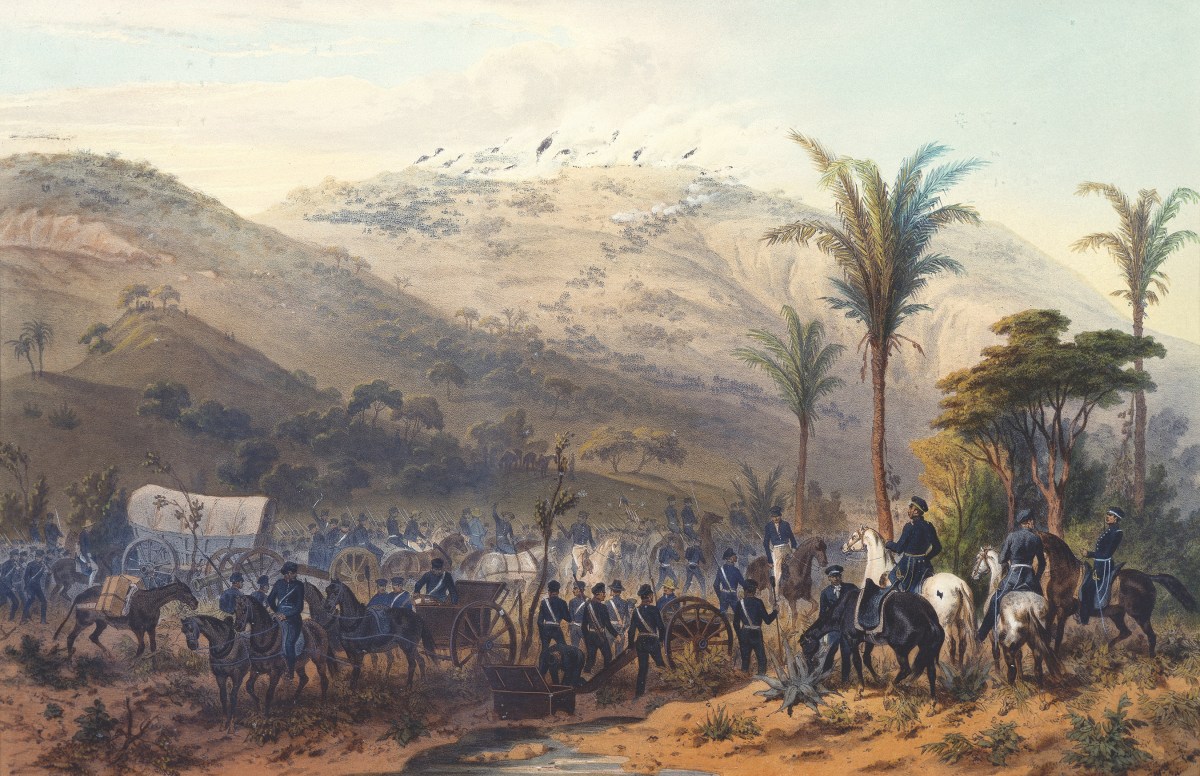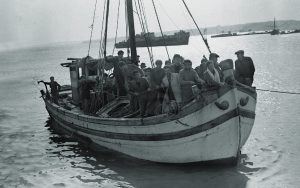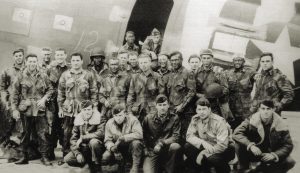By the time George Ballentine, a handloom weaver and British Army veteran in Paisley, Scotland, decided to emigrate to the United States in the summer of 1845, his country had fallen on hard times. The widespread adoption of power looms throughout Great Britain had put his profession on the path to extinction, and, like many of his countrymen, Ballentine could earn only starvation wages. He hoped to find work as a weaver when he arrived in New York, but almost immediately he found his prospects there to be nearly as dismal. One day, on hearing that he could earn more than $100 a year as an American soldier (in addition to having his basic needs met), Ballentine walked into a U.S. Army recruiting office in lower Manhattan and offered to enlist for a five-year tour of duty.
A recruiting sergeant informed Ballentine that he had been ordered not to accept former British servicemen on
the grounds that deserters generally turned out to be bad soldiers. But Ballentine had papers proving that he had purchased his discharge some five years earlier, and so on August 12, 1845, he joined the U.S. Army at age 33.
Sent to Fort Pickens, on Florida’s Santa Rosa Island, for training, Ballentine found himself mostly in the company of Irish, Scottish, and German immigrants. Assigned to Battery I, 1st U.S. Artillery, he became part of the 12,000-man force led by Major General Winfield Scott that landed at Veracruz during the Mexican-American War and fought its way to the Mexican capital. The following account of the Battle of Cerro Gordo, on April 18, 1847, is drawn from Autobiography of an English Soldier in the United States Army, Ballentine’s 1853 memoir.
It was about 2 o’clock when we heard a few musket shots in front, followed by the sharp crack of our rifles, who had got within range of the advanced line of piquets. We immediately got the word to close up, and move in quick time to the front, and in a few minutes we were at the bottom of the hill occupied by the enemy. “First Artillery and Rifles form into line, and charge up the hill,” was the word of command now given by [Brigadier] General [David E.] Twiggs. “I beg pardon, General, how far shall we charge them?” I heard one of our captains ask, as we hastily scrambled up. “Charge them to h—ll,” was the reply of the rough old veteran, who remained with the rest of the division at the bottom of the hill.
The balls came whistling in no very pleasant manner as we made our way up the steep hill, helping ourselves occasionally by the branches of the bushes; but the Mexicans are bad shots, and besides they were afraid to expose themselves by coming forward to take deliberate aim; so that all their balls went whistling over our heads, doing us no damage whatever. In the meantime on we went, shouting and hurrahing as if we were going to some delightful entertainment, every one in a state of the highest excitement, and nearly out of breath with hurrahing and running up the steep hill.
Before we reached the top of the hill, which we did with very trifling loss, the Mexicans quickly retreated down the opposite side of it, and now we experienced the bad effects of General Twiggs’s expression, “Charge them to h—ll.” After obtaining possession of the hill, our object, I suspect, should have been to retain it in possession with the least possible amount of loss—General Scott having resolved to plant two 24-pounders on it during the night, and to open a fire early next morning on the battery at Cerro Gordo, and upon that side of the hill which he intended we should carry by assault. The summit of the hill is nearly half a mile distant from that of Cerro Gordo, and they are separated by a deep and rugged ravine. Our men were extended about half-a-mile along the face of the hill, firing upon the retreating Mexicans, with whom, in the eagerness of pursuit, we had become almost mixed up as we pursued them down the ravine. But when the enemy had got halfway up the opposite hill of Cerro Gordo, we saw the error we had committed in pursuing them, being now caught in a complete fix.
To attempt to retreat up the hill in the face of the continuous fire of some thousands of Mexican infantry, and that of their batteries, who now opened a crossfire (those to the left sweeping the side of the hill with round shot, and that of Cerro Gordo opposite pouring in volleys of grape and canister), would have been instant and total destruction. We were forced to remain therefore under the cover of rocks and trees, firing an occasional shot at the enemy only, who kept up an incessant, though fortunately for us a very ill-directed fire until near sunset. Indeed the loud and
incessant roll of musketry all that afternoon, exceeded anything of the kind I ever heard.
At length, towards sunset, the enemy seemed preparing for a grand charge; there was a cessation of firing nearly; we could observe their officers forming their men into the ranks, and with colours displayed, and a band of music playing in front, they at last advanced towards our position, which at that moment seemed sufficiently perilous.
We had a small howitzer, of the kind called mountain howitzers, from their peculiar convenience in mountain warfare, for which they were expressly made; being light, and easily dismounted and carried up a hill. This was prepared for their reception, being well loaded with grape, and we waited with some anxiety to see its effects. On they came till near the bottom of the ravine, and within two or three hundred yards of us, when the howitzer sent its murderous contents among them. I never saw such sudden havoc and confusion caused by a single shot. It swept right into the head of the advancing column, killing and wounding a great number of those in advance, among others several of the band, who ceased playing the moment the shot struck the column, which halted almost instantly.

The Mexicans were thoroughly taken by surprise by this shot, and had quickly resolved not to risk another, for taking up their wounded they immediately began to retire to their former position. Except a straggling shot now and then, the firing on both sides soon ceased; it was getting dusk, and our men began to make their way to the main body by circling round the hill. Parties were now sent out to search for and carry in the wounded; but owing to the nature of the ground, and the darkness of the night, with a share of culpable neglect on the part of those whose duty it was to see the search more carefully prosecuted, I am afraid a number of the wounded perished, who might have recovered if they had been promptly attended to.
Some men have blamed General Twiggs for leaving the remainder of the division inactive, while the small body sent to drive in the piquets were in such a dangerous predicament; but there I think he acted with good judgment. Had he engaged the whole division, he might have extricated the first party, but assuredly with a far greater sacrifice of life. Nothing but the paucity of our numbers, paradoxical as it may seem, saved us from a general slaughter on the occasion, enabling us to obtain the cover, of which a large body could not have equally availed themselves. The great fault which I, in common with all my comrades with whom I have conversed on the topic, think he committed, was that he did not give more explicit instructions to the officers in command of companies sent out on that occasion. Perhaps he did not clearly comprehend the instructions he had received from General Scott himself. At all events that a blunder had been made was evident, that it had cost us nearly two hundred men equally so, but no one thought of General Scott in connection with it. General Twiggs has all the credit of the first day of the battle of Cerro Gordo.
It was now dark, with a slight rain, and amidst the groans of the suffering wounded, who were having their wounds dressed, and amputations performed until late at night, the most smooth and soft piece of turf having been selected for their accommodation, tired and weary, we lay down to seek repose, and recruit our strength for the struggle of next morning. I had the bad fortune to be on a piece of ground which was full of small stones, but as we were ordered to keep our places as if in the ranks, in case of a night attack, I could not better it by shifting my ground. Still I managed to pick up a considerable number of them, and at last I found that it was somewhat more endurable. There was not much conversation amongst us this night, but taking a few mouthfuls of biscuit, a drink of water, and a smoke, we made ourselves as comfortable as, under the circumstances, was possible.
There was no disguising the fact that we had an ugly job before us next morning; but we had strong ground for hope in the positive cowardice of the Mexicans, our own comparative courage, and the superlative skill of General Scott. Besides, we had come through the baptism of fire that day, and were still unhurt, and perhaps we should be equally fortunate the next.
During the night, while we slept, the guns had with incredible exertions been got to the summit of the hill, and placed in position for opening upon Cerro Gordo next morning. A temporary breastwork of stones and earth had also been thrown up. When day broke, we immediately fell into the ranks, and began to ascend the hill. As we marched by a circuitous path, some of us turned occasionally to admire the appearance of the sky, which was tinted with a surpassing brilliance by the rising sun, while spread out beneath us, as far as the eye could reach, was some of the most picturesque and romantic scenery imaginable. But we were soon recalled to another sort of contemplation. A shot from the enemy’s batteries, who had now caught a glimpse of us, followed by another and another in quick succession, soon dispelled any disposition to sentimentalize. And having been cautioned to close up and quicken our steps, in a few minutes we gained the position we were to occupy, until the signal should be given for the charge.
There was a slight hollow in the top of the hill near where our 24-pounders were placed, and opposite Cerro Gordo; this was the position we ought to have maintained on the previous afternoon in place of following the Mexicans so rashly. In this hollow the rifles, a regiment of infantry, and our regiment, were ordered to lie down on the grass, in which position we were completely sheltered from the fire of the enemy’s batteries. While lying thus, we could watch the effects of the grape shot passing a few feet above us, with its peculiar harsh and bitter whistle, to the opposite bank, where the saplings and branches crashed, under the withering influence of these unseen messengers, as if by magic. But soon our 24-pounders opened on the Mexicans with most terrible effect, as they were in a dense mass on the top of the opposite hill, where some thousands of infantry were crowded, to repel our anticipated assault. We now received orders to prepare for a charge. While the rifles were forming in the bottom of the hollow, one end of their line had incautiously gone a little way up on the opposite bank, or side of the hill. A shower of grape, that killed and wounded at least a dozen of their number, was the result of this exposure, and a volley of oaths from Colonel [William S.] Harney, at the stupidity of the officer who had formed them in that position, seemed to grate as harshly on one’s ears as the missiles showering over us.
While this was going on, a division of volunteers under [Brigadier] General [Gideon Johnson] Pillow, had assaulted the batteries on our left, but were repulsed with considerable loss, [Brigadier] General [James] Shields being amongst the severely wounded. The moment had now arrived when we were to face the horizontal shower which for the last hour and a half had been flying almost harmless over us. But the 24-pounders had done wonders, and Cerro Gordo was getting rather thinned of infantry by the panic created by their deadly discharges. The activity of the Mexican artillery was also rather slackened, they were evidently getting paralysed, and discouraged, at seeing the effects of our shots. Now was the time for the charge, and pausing for a few breathless moments till the next shower of grape hurtled over us, the bugle sounded the charge, and with a loud hurrah we leaped and tumbled down the ravine, opposite the enemy’s battery of Cerro Gordo.
A brisk fire of infantry opened upon us as we descended, and a few of our number dropped by the way; but we were in too great a hurry to stay and assist, or sympathize with wounded men just at that time. Bill Crawford, a Scotchman, and an old British soldier, with whom I had become acquainted at Vera Cruz, was going down the hill with me; we were within a few yards of each other, when recognising me he called out, “Ha! Geordie man, hoo are ye this morning, this is gey hot wark, how d’ye like this! Faith, Geordie; I doubt they’ve hit me,” he continued, as he sat down behind a rock, a musket ball having entered the calf of his leg. I asked him if he was badly hurt. “I’ve gotten a scart that’ll keep me frae gaun on; but gudesake, man, dinna mind me, I’ve shelter here; an I ken ye’ll no like to be the last o’ gaun up the hill.” I had just jumped down four or five feet, when a rattle of grape that splintered a ledge of rock where I had stood while talking to Bill, showed me the danger of delay. “Ah, Geordie, a miss is as gude as a mile; gude bye, tak tent o’ yoursel’; tell our folk where I’m sitting, when it’s ower,” cried the hearty old fellow, who had come through the Peninsula and Waterloo, unhurt, to be wounded in this shabby affair. It was not long before I reached the bottom of the hill.
On arriving there, both men and officers paused, but only for a few seconds, to recover breath. Here, feeling my havresac, containing biscuit and other articles, an incumbrance, I took it off and threw it down at the foot of a large rock, intending to call again for it if I could find an opportunity after the action. We then began to climb the hill, which was very steep, but being rocky, and covered with brushwood for about two-thirds of the way, the enemy’s musket balls passed quite harmlessly over us until near the top. When we arrived at the summit, a hundred or two of the Mexican infantry posted behind a breastwork of large stones, checked our advance for three or four minutes, until seeing us reinforced by a number of infantry coming up the hill cheering, they threw their muskets down, and scampered in the utmost confusion down the opposite side of the hill. Several of the enemy’s guns were now manned, and fired on the retreating enemy, a disordered mass, running with panic speed down the hill, and along the road to Jalapa. The battle was now won; the other two forts, that a short time before had repulsed the volunteers, seeing the fate of Cerro Gordo, immediately pulled down their flag and hoisted a white one. They made an unconditional surrender, and the garrisons were marched out of the batteries to the road, without arms, to the amount of about 8000; they were employed to dig pits for the interment of the dead, and were afterwards permitted to go to their homes, on promising not to take up arms against the United States during the existing war. MHQ
[hr]
This article appears in the Autumn 2020 issue (Vol. 33, No. 1) of MHQ—The Quarterly Journal of Military History with the headline: Experience | A Scot at Cerro Gordo

Want to have the lavishly illustrated, premium-quality print edition of MHQ delivered directly to you four times a year? Subscribe now at special savings!





